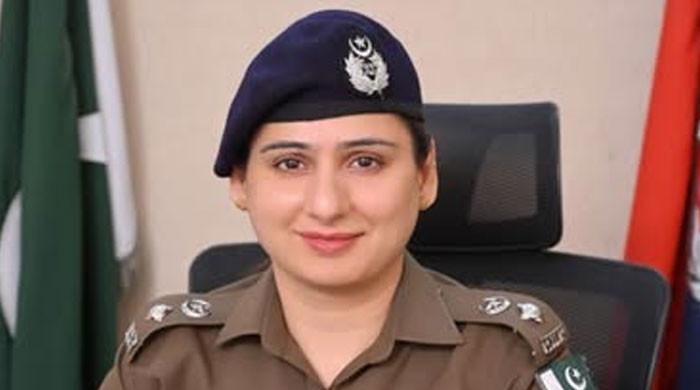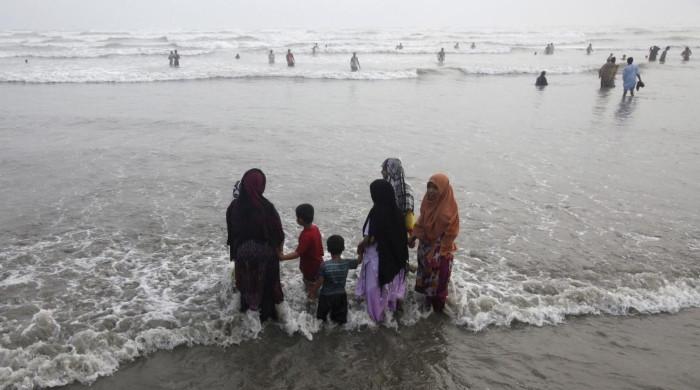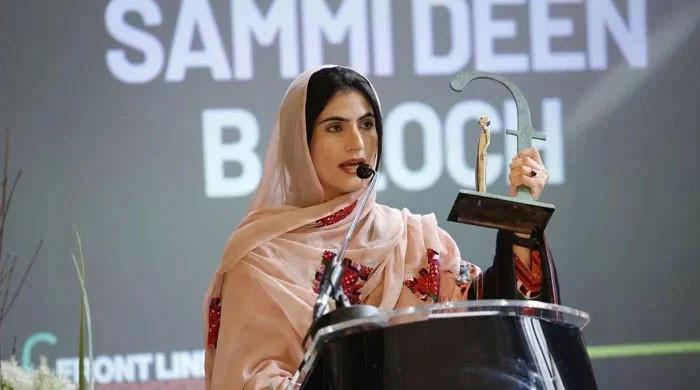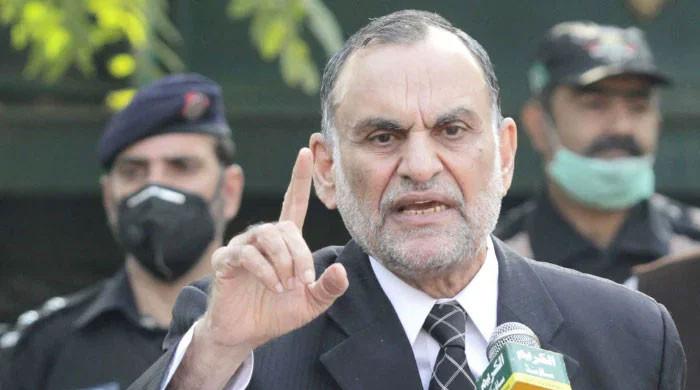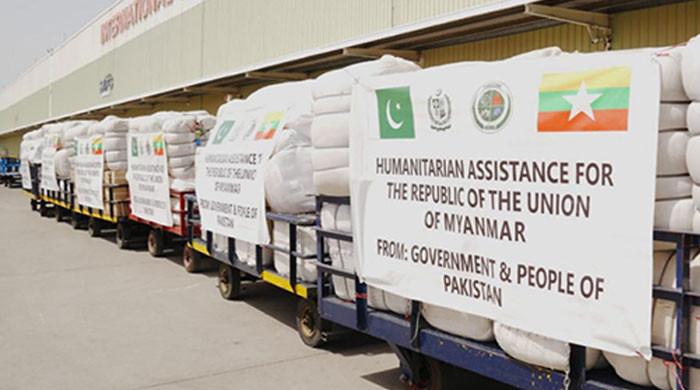IHC reserves verdict in prohibited funding case
IHC Chief Justice Aamer Farooq remarks court exists to make legal decisions, not resolve political matters
January 11, 2023
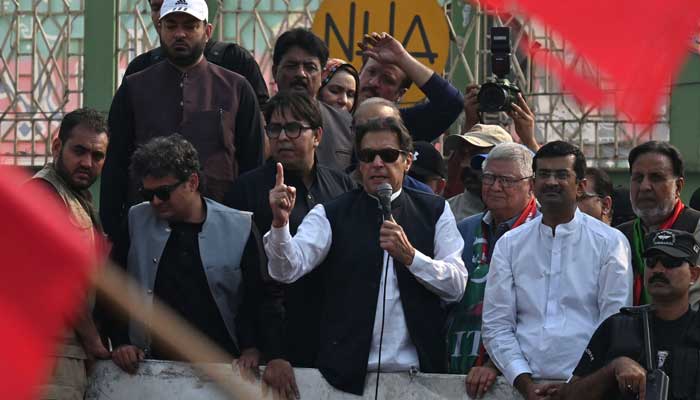
- ECP ruled PTI of receiving "illicit" funds.
- IHC CJ says court doesn't exist to resolve political matters.
- IHC Justice Babar Sattar terms ECP autonomous body.
ISLAMABAD: The Islamabad High Court (IHC) Wednesday reserved its verdict on Pakistan Tehreek-e-Insaf's (PTI) plea against the Election Commission of Pakistan's (ECP) ruling in the prohibited funding case.
The ECP had, in August last year, ruled that the party had received "illicit" funds and donations from the United States, Australia, Canada, and the United Arab Emirates (UAE).
A larger bench of the IHC — headed by IHC Chief Justice Aamer Farooq and comprising Justice Miangul Hassan and Justice Babar Sattar — heard the case.
Ahead of reserving the verdict, IHC Chief Justice Aamer Farooq remarked that the court exists to make legal decisions and not resolve political matters. He added that the ECP was only supposed to work constitutionally, which was limited to the confiscation of funds.
The IHC has told the election commission that if the party succeeds in proving that its funding was not prohibited, then the ECP would have to take back its August decision.
Today’s hearing
Addressing the ECP’s counsel, Justice Farooq said that the court will make it clear that the issuance of show cause is done with a purpose, it isn’t an aimless action. "If the ECP is determined to stick with its original decision, then the show cause has no point."
Justice Sattar remarked that the ECP is an autonomous institution asking the PTI to satisfy the electoral body.
The ECP’s counsel, meanwhile, said that if the PTI is able to satisfy the commission about new evidence related to the funding and that it is not illicit, then their funds won’t be confiscated.
PTI’s lawyer Anwar Mansoor Khan said the ECP, while declaring the PTI as a foreign-funded party, termed its chairman Imran Khan’s declaration incorrect.
“Chartered accountants deal with matters of accounts for political parties. The election commission’s report has targeted us,” he said.
Justice Farooq mentioned that the commission has not given any declaration in its report.
“The election commission’s ruling is being called an order, report, or merely an opinion at places. In my view, it is a fact-finding report,” the chief justice remarked.
The ECP’s counsel insisted that it is not just a report but a verdict. “Election commission cannot issue a show cause notice without the verdict,” the lawyer said.
Barrister Mansoor said that the ECP did not notice the PTI chief.
Justice Farooq asked the PTI counsel if he fears Khan will be disqualified for this matter. The ECP will neither give any declaration in their show-cause notice nor pursue criminal proceedings, he said.
“Election commission’s show cause notice is only limited to confiscation of funds. What will happen if a party’s funds get confiscated and there is no balance in the party accounts?” Justice Farooq asked the ECP’s lawyer, responding to which he assured him cooperation.
Justice Hassan inquired if the ECP had any legal authority to direct the matter to the federal government.
“Under which law did you refer the matter to the federal government?” he asked the ECP counsel, commenting that doing so was equivalent to acting out on grudges against the party.
The justice reprimanded the commission’s counsel.
While referring to Article 62(1)(f) of the Constitution, which pertains to the qualification of members of Parliament and the terms sadiq and ameen, he said: “You declared a man to be dishonest. If someone were to start Article 62(1)(f) proceedings against him what would you do? Especially, if the PTI was to successfully defend itself against the show cause?”
The ECP’s legal counsel replied that the matter would end automatically, should the PTI successfully defend itself.
He further added that if the ECP had not referred the matter to the federal government, the government could have taken action since the report is now public. “We will listen to the PTI in the matter of the show cause with an open mind,” he clarified.
Justice Sattar observed that the matter was a simple one and had been drawn out unduly for six years.
Addressing the PTI counsel, he said that it was incumbent on each party to provide details of its funds. “If the ECP is not satisfied, the funds are confiscated through a show cause notice,” he said and added, “since a show cause notice has been issued to you, you must respond with evidence to satisfy them”.
At this, Mansoor underscored the fact that the ECP had declared it would not retract its decision. He further requested that the IHC ask the ECP to delete the last two sentences of its report.
The chief justice maintained that this was beyond its current scope and the matter would be looked into by the court during the judicial review. He reiterated that the ECP had already said it was willing to hear the evidence without any bias.
On the ECP counsel’s assertion that the commission had no authority to review its decision, Justice Hassan wondered about the point of the show cause.
“You do not have the power to change the decision, but if it were to be discovered that the funds are not prohibited, then the decision will have to be altered,” he stated.
After hearing the arguments of both parties, the court reserved its decision.
PTI challenges ECP ruling
The PTI had, on August 10 last year, challenged the ECP ruling in the IHC, seeking annulment of the order in the prohibited funding case.
In his petition filed with the IHC, PTI Additional Secretary-General Omar Ayub asked the court to not only nullify the August 2 ruling, but also revoke the ECP's show-cause notice sent to PTI Chairman Imran Khan.
The petitioner said he was "grossly aggrieved" by the fact-finding report — which revealed that the PTI had obtained funds from foreign sources — and demanded that it be declared "perverse, incorrect and in excess of authority and jurisdiction".
In his petition, he also asked the court to "declare that any action suggested by the ECP is beyond its authority and that no action can be taken on the basis of a fact-finding report".
The PTI also made the ECP a party in the case.
ECP's verdict in prohibited funding case
On August 02, 2022, the ECP, in a unanimous verdict, announced that the PTI received prohibited funding. The case was earlier referred to as the "foreign funding" case, but later the election commission accepted the PTI's plea to refer to it as the "prohibited funding" case.
The commission found that donations were taken from America, Australia, Canada and the UAE.
PTI received funds from 34 individuals and 351 businesses including companies, the ECP verdict stated.
Thirteen unknown accounts also came to light, said the commission in the verdict, adding that hiding accounts are a "violation" of Article 17 of the Constitution.
The funds were also in violation of Article 6 of the Political Parties Act.
Moreover, the ECP found that Khan submitted a false Nomination Form I and that the affidavit provided regarding party accounts was also not authentic.




